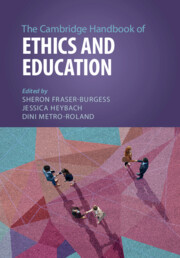Book contents
- The Cambridge Handbook of Ethics and Education
- The Cambridge Handbook of Ethics and Education
- Copyright page
- Epigraph
- Contents
- Figures
- Tables
- Contributors
- Foreword
- Preface
- Acknowledgments
- Part I Traditions in Ethics and Education
- Part II Ethics and Education in Practice
- 15 Why Educate?
- 16 The Displacement of Ethics in Education through Educational Standardization
- 17 School Health Policies and Practices
- 18 Value Creation and Happiness in Education
- 19 Children’s Rights, Childhood, and the Sovereignty of the Good
- 20 School Discipline and the Ethics of Punishment
- 21 Educating All Children
- 22 Decolonizing Curricula
- 23 The Political Necessity and Perilous Ambiguity of “Academic Freedom”
- 24 Teacher Activism and Ethical Speech
- 25 The Specter of Agreement
- 26 Philosophical Reflections on Ethics in Teaching and Teacher Education
- 27 The Ethical Dimension of Educating Educators
- Part III Emerging Ethical Pathways and Frameworks
- Index
- References
19 - Children’s Rights, Childhood, and the Sovereignty of the Good
from Part II - Ethics and Education in Practice
Published online by Cambridge University Press: 07 March 2024
- The Cambridge Handbook of Ethics and Education
- The Cambridge Handbook of Ethics and Education
- Copyright page
- Epigraph
- Contents
- Figures
- Tables
- Contributors
- Foreword
- Preface
- Acknowledgments
- Part I Traditions in Ethics and Education
- Part II Ethics and Education in Practice
- 15 Why Educate?
- 16 The Displacement of Ethics in Education through Educational Standardization
- 17 School Health Policies and Practices
- 18 Value Creation and Happiness in Education
- 19 Children’s Rights, Childhood, and the Sovereignty of the Good
- 20 School Discipline and the Ethics of Punishment
- 21 Educating All Children
- 22 Decolonizing Curricula
- 23 The Political Necessity and Perilous Ambiguity of “Academic Freedom”
- 24 Teacher Activism and Ethical Speech
- 25 The Specter of Agreement
- 26 Philosophical Reflections on Ethics in Teaching and Teacher Education
- 27 The Ethical Dimension of Educating Educators
- Part III Emerging Ethical Pathways and Frameworks
- Index
- References
Summary
The aim of this chapter is to establish that children are owed a sense of their own interiority. The chapter argues that although the literature on philosophy of childhood constitutes an advance on the deficit model of childhood insofar as it supports children’s rights and childhood goods, it risks reifying adult-child relations by continuing to essentialize childhood. While Gareth B. Matthews’ theory of development as socially and linguistically mediated begins to shift the focus toward the child’s own inner life, it falls short insofar as it fails to challenge the fact/value dichotomy. Drawing upon Iris Murdoch’s philosophy, the chapter concludes that a rejection of this dichotomy is in fact necessary for developing the notion of a morally inflected consciousness that is as available to children as it is adults.
- Type
- Chapter
- Information
- The Cambridge Handbook of Ethics and Education , pp. 400 - 421Publisher: Cambridge University PressPrint publication year: 2024

